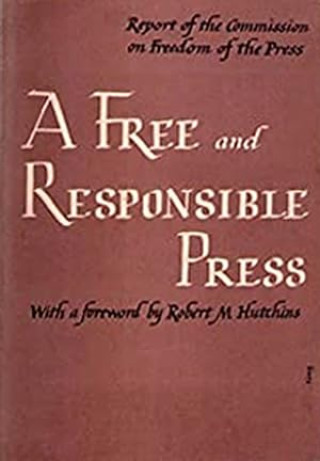Henry R. Luce, the publisher of Time Inc., first proposed engaging a panel of scholars on the state of the American press in December of 1942. He suggested the idea to his friend Robert Maynard Hutchins, a legal and educational philosopher who, just over a decade earlier, at the age of thirty, had become the president of the University of Chicago. With the country mobilized for the fight against totalitarianism, Luce envisioned a philosophical inquiry that would reaffirm the foundations of freedom in the United States. Distrust of the media had become pervasive, and Luce believed that the public needed to better understand the purpose and function of the press. At first, Hutchins demurred, contending that the project would be too difficult to organize. Finally, in the fall of 1943, after months of Luce’s cajoling, he agreed to lead the effort.
On December 15, 1943, a group of academics and policymakers gathered for the first time at the University Club, in New York. Luce’s initial idea had been to enlist the University of Chicago’s philosophy department, but Hutchins went in a different direction, selecting luminaries from a range of disciplines. The group included Reinhold Niebuhr, the theologian and ethicist; Charles E. Merriam, one of the nation’s leading political scientists; Arthur M. Schlesinger, Sr., a Harvard historian; Archibald MacLeish, the librarian of Congress and a Pulitzer Prize-winning poet; and William Ernest Hocking, a renowned philosopher of religion. None were journalists; Hutchins believed that the industry needed to be excavated by outsiders. The thirteen Americans and four international advisers, whom Hutchins called the Commission on the Freedom of the Press, would spend nearly three years evaluating American journalism. In a statement of principles, Hutchins told them that their purpose was to answer three questions: “What society do we want? What do we have? How can the press . . . be used to get what we want?”
In “An Aristocracy of Critics: Luce, Hutchins, Niebuhr, and the Committee that Redefined the Freedom of the Press” (Yale), Stephen Bates, a journalism professor at the University of Nevada, Las Vegas, re-creates the panel’s deliberations. As fascism advanced in Europe, there was a palpable sense that liberties were imperilled at home; in an essay published in the Times, Henry A. Wallace, Franklin D. Roosevelt’s Vice-President, compared fascism to an “infectious disease” and warned against the “deliberate, systematic poisoning of the public channels of information.” Commission members worried about the forces of division in American society, the power of tribalism to warp political debate, and the press’s role in provoking discord. Americans were inhabiting “different worlds of fact and judgment,” John M. Clark, a Columbia University economist, said. Hocking, the philosopher of religion, considered the way a publication and its readers could create a closed system that was rage-filled, self-reinforcing, and profitable; another commission member, George Shuster, the president of Hunter College, warned that a one-sided press could “pull the house apart.”
